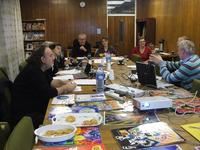RESOURCES
Science Across the World
Science Across the World is a curriculum-based exchange programme for schools around the world.It has an archive of science topic resources for classes to use for their exchange.
The topics are translated into several languages (6 main EU languages including English, French, German, Spanish, Italian and Portuguese) and others.
The programme has developed a lot over the years since its creation in the 1990s.
Today the resources are hosted by the Association for Science Education in the UK.
![/userfiles/files/ase-map.jpg [/userfiles/files/ase-map.jpg]](/userfiles/files/ase-map.jpg)
Many colleagues use other platforms such as E-Twinning and FACTWorld to carry out schools linking activities.
This space is dedicated to sharing ideas, resources and information about schools link using Science Across resources and other topics from the curriculum.
Links to topics and comments
(the links take you to the STEM archive)
For each of the topics, there is a collection of sample exchange forms on this site. It's a good idea to see what other schools have done.
Acid Rain
This topic looks at fossil fuel burning (sulphur production), weather patterns and pollution migration between countries. It's a great topic to get students looking at how 'clean' their country is in terms of fossil fuel burning.
Biodiversity Around Us
This is one of my favourite topics, purely and simply because although it's a science topic, it's a dream for examining culture. Biodiversity is a global topic but its representation in different parts of the world lies behind much of our culture heritage and values.
Chemistry in our Lives
If you want to get your class working on simple chemistry, how their lives are drenched in chemistry, get them creating chemical products like cosmetics, shampoos, gels, etc, then this is the topic for you. Get your students to market their products, and 'sell' them to their partners in other countries.
Climate Change
Get your students working with a variety of sources, including the internet, to gather the information about Climate Change. In particular you can explore how climate change might affect your own country. You might also find out something about the way the media reports the issues.
Domestic Waste (easily adaptable to younger learners)
I use this topic a lot in teacher training workshops, because it's something anyone and everyone can talk about, rubbish. Imagine 7 bags of rubbish, all from different sources, and asking your students to examine the rubbish, and make predictions about the person / people who made the rubbish.
Drinking Water
This is a very relevant topic recently to celebrate the International Year of Chemistry and one of the initiatives of the celebration was World Water investigations. Do your students drink from the tap? Do they have clean water at home, what are the visible particles in their drinking water if any?
Global Solar Partners
A new project in a very up-to-date topic of solar energy.
How Plants Grow
A very common topic in primary and secondary science.
Keeping Healthy
Another popular topic where students look at their lifestyles, look at exercise habits and survey the amount of time they spend exercising to share with partners in other countries.
Plants in our Lives
What plants do your students eat? What plants are used in their cooking, medicine, cleaning, decorating, beauty products?
Talking about Food
Variation of What did you Eat?
Talking about Genetics
This topic was written around the time of the 50th anniversary of the discovery of the helical structure of DNA, carries many ethical questions in it, and is perfect for debates.
What did you Eat?
Another favourite of mine. I've done this topic many times and one of my students' reports is attached in a link below as 'WDYE Newsletter'. Simply put, kids love food, and talking about it and finding out what others eat too!
and for younger learners...
Eating and Drinking
This topic is based on the topic above What did you Eat? and is specially designed for younger learners.
Food Glorious Food (a variant of Eating and Drinking)
A variation of Eating and Drinking
Plants and Me
A version of the topics above on plants for older learners designed for the young learner classroom.



